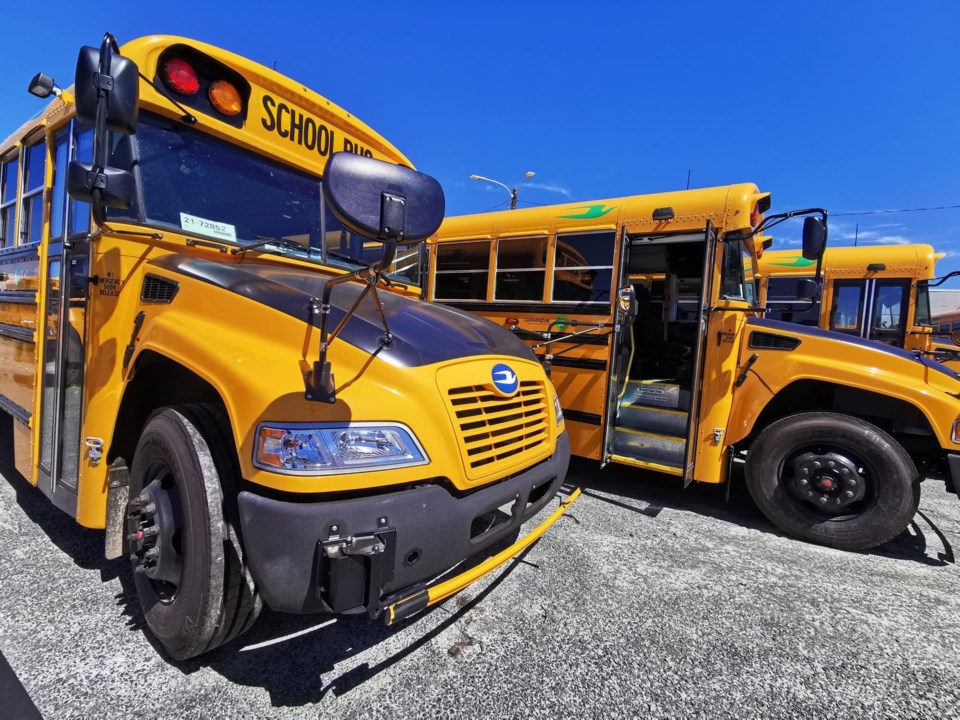School buses for Holy Trinity Catholic School Division collectively travel an average of 253 kilometres per day on regular in-city routes, which is equivalent to driving across Canada every 13 days.
That was one of the interesting bits of information contained in a semi-annual 2021-22 transportation accountability report that division trustees received during their recent board of education meeting.
From Sept. 1, 2021 to Feb. 28, 2022, school buses transported 1,122 students to schools throughout the division. This included 492 Moose Jaw students, 170 students from Prairie South School Division, 427 students in Swift Current and 33 students in Assiniboia, the report said.
There are 28 transportation runs in Moose Jaw, and during the first six months of the year, 42 runs were cancelled due to weather.
Holy Trinity also has a bussing contract with Swift Current-based Chinook Public School Division. From September to February, Chinook cancelled 232 runs in that corner of the province.
“Chinook — as well as a number of other Saskatchewan school divisions — are experiencing … significant challenges with respect to bus driver shortages,” explained CFO Curt Van Parys. “So, in those instances with Chinook, it was a matter of not having enough bus drivers to provide the service that was required. And also related to the COVID challenges that we’ve experienced in the last several months.”
Holy Trinity is “a bit of an anomaly” when it comes to having enough drivers for the Moose Jaw routes, he continued. The division has seven regular drivers and three spare drivers who can fill in when required. This leaves the organization in a good position and ensures it doesn’t have to cancel runs.
Van Parys added that Holy Trinity has a bus contract with Chinook, which concludes at the end of this school year.
The average age of the Moose Jaw bus fleet is 5.1 years, while the average age of buses on other regular routes is 4.5 years and for the spare fleet is six years, Van Parys said. These are significant changes considering the average age of the bus fleet last year was 9.25 years.
“So we’ve pretty much cut that in half with the fleet renewal. And fleet renewal is proving to be a very good thing so far,” he noted.
The average ride time in Moose Jaw from September to February was 26 minutes, while the longest one-way ride time in Moose Jaw was 27 minutes, the report showed.
The report also indicated that the average capacity usage rate on the buses — a measurement of the total number of kids in the vehicles — was 59.5 per cent. However, Van Parys pushed back against that figure, saying it’s closer to 84 per cent. He believed the discrepancy was due to how the transportation manager measured bus usage rates, so he planned to work with the manager to adjust that figure in the future.
Van Parys then highlighted some activities that occurred within the transportation department over the past six months.
For example, Holy Trinity has nine school buses, but it retired six diesel vehicles earlier in the year and replaced them with newer propane buses to complement the other three propane vehicles. Projected annual lease costs for the new vehicles are $176,400.
Furthermore, the division eliminated its reliance on Prairie South to maintain its buses. Instead, the division secured a new partnership with a Regina company, which “is working very well,” said Van Parys.
Repair costs from Sept. 1 to Feb. 28 were $5,016, whereas, compared to the three previous fiscal periods, repairs and maintenance costs averaged $43,122.
The next Holy Trinity board meeting is Monday, April 11.




